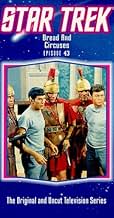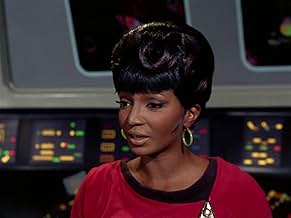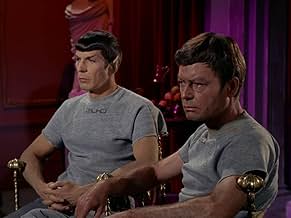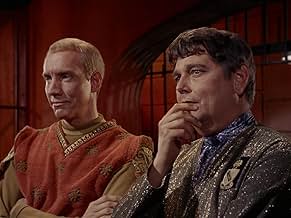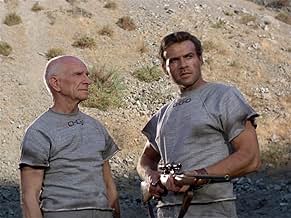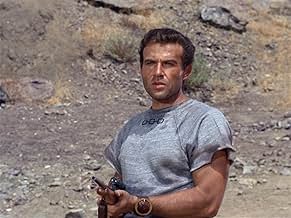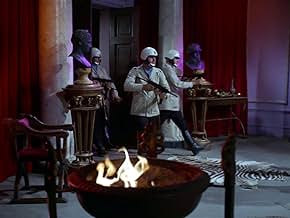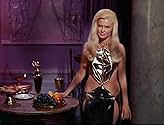Bread and Circuses
- Episode aired Mar 15, 1968
- TV-PG
- 50m
IMDb RATING
7.0/10
3.6K
YOUR RATING
The Enterprise crew investigates the disappearance of a ship's crew on a planet that is a modern version of the Roman Empire.The Enterprise crew investigates the disappearance of a ship's crew on a planet that is a modern version of the Roman Empire.The Enterprise crew investigates the disappearance of a ship's crew on a planet that is a modern version of the Roman Empire.
Bart La Rue
- Announcer
- (as Bart Larue)
Paul Baxley
- Policeman #1
- (uncredited)
Bill Blackburn
- Lieutenant Hadley
- (uncredited)
Frank da Vinci
- Lt. Brent
- (uncredited)
Featured reviews
What makes this episode memorable to me after nearly forty years is not the tired, clumsy gladiator swordfights -- and certainly not the historically dubious tributes to Christianity as a religion of peace.
The power of this episode actually comes from the backstory of the minor villain, Merrick aka "Mericus." The real theme of this episode is the redemption of a man who once dreamed of being a Starship Captain, like Kirk, but was doomed by a single moment of cowardice to a lifetime of self-loathing. This is basically a retelling of LORD JIM by Joseph Conrad, with perhaps a dash of THE SHORT HAPPY LIFE OF FRANCES MACOMBER by Ernest Hemingway.
The clues come right away that Merrick is disgusted with himself. He's supposed to be questioning Kirk but really he's the one begging to be heard out, to be absolved. "Lots to talk about, Jim. Lots to explain." Later, when Kirk is absolutely ice-cold under pressure, watching Spock and McCoy face death in the arena, Merrick helpfully points out, "Proconsul, he commands not only a space ship, but a star ship. A very special ship, and crew. I once tried for such a command." Poor Merrick does everything but break down and bawl here. "I coulda been a contendah!"
The truly vile specimen in this episode is the proconsul, a fat little man who never gets tired of rubbing salt in Merrick's wounds. Watch how he makes Merrick pat Kirk down for weapons like a flunky. And listen for that little dig, "the thoughts of one man to another cannot possibly interest you, Merrick." All this stuff is a lot more hateful -- and closer to everyday life for most of us -- than sending men to die in the arena. And it's all the more grim in that this repulsive punk of a proconsul is still alive at the end, and will presumably live to die in bed, evil and unpunished. Tough stuff.
But in the end, what real uplift this episode provides is not Uhura's asinine speech about "The Son" but watching Merrick grab that communicator and shout, "Enterprise, lock on to this transmission. Three to beam up -- ACK!!!!"
Merrick lived a coward, but dies a hero -- in a tragic ending worthy of Conrad.
The power of this episode actually comes from the backstory of the minor villain, Merrick aka "Mericus." The real theme of this episode is the redemption of a man who once dreamed of being a Starship Captain, like Kirk, but was doomed by a single moment of cowardice to a lifetime of self-loathing. This is basically a retelling of LORD JIM by Joseph Conrad, with perhaps a dash of THE SHORT HAPPY LIFE OF FRANCES MACOMBER by Ernest Hemingway.
The clues come right away that Merrick is disgusted with himself. He's supposed to be questioning Kirk but really he's the one begging to be heard out, to be absolved. "Lots to talk about, Jim. Lots to explain." Later, when Kirk is absolutely ice-cold under pressure, watching Spock and McCoy face death in the arena, Merrick helpfully points out, "Proconsul, he commands not only a space ship, but a star ship. A very special ship, and crew. I once tried for such a command." Poor Merrick does everything but break down and bawl here. "I coulda been a contendah!"
The truly vile specimen in this episode is the proconsul, a fat little man who never gets tired of rubbing salt in Merrick's wounds. Watch how he makes Merrick pat Kirk down for weapons like a flunky. And listen for that little dig, "the thoughts of one man to another cannot possibly interest you, Merrick." All this stuff is a lot more hateful -- and closer to everyday life for most of us -- than sending men to die in the arena. And it's all the more grim in that this repulsive punk of a proconsul is still alive at the end, and will presumably live to die in bed, evil and unpunished. Tough stuff.
But in the end, what real uplift this episode provides is not Uhura's asinine speech about "The Son" but watching Merrick grab that communicator and shout, "Enterprise, lock on to this transmission. Three to beam up -- ACK!!!!"
Merrick lived a coward, but dies a hero -- in a tragic ending worthy of Conrad.
Kirk, Spock, and Bones beam down to a planet because it is quite possible that the survivors of a space catastrophe have ended up there. They find that the society of this planet is modeled after ancient Rome - complete with gladiators and slaves - except that it's been given a 20th century twist. (These people are fond of television.) Our trio of heroes are going to end up participating in the "games" before there is any chance of escape.
By this point, it was clear that the series was in something of a rut, with too many stories set in representations of moments in Earth history, and too many stories in which the Prime Directive is broken. A former associate of Kirks' is involved, a man named Merik (William Smithers, "Papillon"), but he's not the true villain; rather he's a weak character dominated by a man named Claudius (Logan Ramsey, "Walking Tall"), who comes to respect Kirk but who is still determined to see him die for his defiance.
I do understand Roddenberry's following of a formula, as it allowed him to examine various social & political facets of our own history through the funnel of a science-fiction series. It just comes as disappointing if one is hoping for more tales of a cosmic nature. Certainly the tales are provocative, however, and do get us talking about them afterwards.
There are pleasures to be had, of course: the ongoing arguments between Spock & Bones (including a dramatic moment where Bones believes he's gotten to the heart of Spocks' character), the sight of Spock & Bones carrying swords & shields, Kirk romancing yet another woman (gorgeous blonde Lois Jewell), and appearances by two other top character actors: Ian Wolfe ("Witness for the Prosecution") and Rhodes Reason ('White Hunter').
Even though these kinds of episodes do tend to get repetitive, they're always "interesting" in the way that they hold a mirror up to our own lives - if not "fascinating".
Seven out of 10.
By this point, it was clear that the series was in something of a rut, with too many stories set in representations of moments in Earth history, and too many stories in which the Prime Directive is broken. A former associate of Kirks' is involved, a man named Merik (William Smithers, "Papillon"), but he's not the true villain; rather he's a weak character dominated by a man named Claudius (Logan Ramsey, "Walking Tall"), who comes to respect Kirk but who is still determined to see him die for his defiance.
I do understand Roddenberry's following of a formula, as it allowed him to examine various social & political facets of our own history through the funnel of a science-fiction series. It just comes as disappointing if one is hoping for more tales of a cosmic nature. Certainly the tales are provocative, however, and do get us talking about them afterwards.
There are pleasures to be had, of course: the ongoing arguments between Spock & Bones (including a dramatic moment where Bones believes he's gotten to the heart of Spocks' character), the sight of Spock & Bones carrying swords & shields, Kirk romancing yet another woman (gorgeous blonde Lois Jewell), and appearances by two other top character actors: Ian Wolfe ("Witness for the Prosecution") and Rhodes Reason ('White Hunter').
Even though these kinds of episodes do tend to get repetitive, they're always "interesting" in the way that they hold a mirror up to our own lives - if not "fascinating".
Seven out of 10.
Communication's officer Lieutenant Uhura sums up the decline and fall of the Roman Empire as the world knows it. The plot is really secondary. It's there to drive the story forward, but the underlying theme tells of the human condition via a reign of pure strength, and its ultimate failure.
This theme is reinforced by one of the supporting characters, an escaped 20th century Roman gladiator, Flavius, and his ultimate sacrifice. He represents the old way, once reformed, but gone back to the rule of Rome by fighting the Romans the only way he knows how.
The basic story is a rescue mission, but the real story is the heartfelt examination of the futility of a society that relies on a slave class to sustain itself on all levels, even down to bloody gladiatorial games as entertainment. Kirk is put through the rigors of experiencing both the pains and pleasures of such a society, and although he understands that he cannot change this world, he does help reinforce the message that will ultimately alter it and its Roman Empire on the most fundamental level.
Note Kirk's line as he talks to Flavius in the cave and pats him on the shoulder. Attach that to Uhura's summation at the end, and you got yourself the entire story: "It's not the sun up in the sky. It's the ..."
Positives; Kirk scores with a hot blonde. Druscilla is a HOTTIE! At least she was in 1967 :-) If I were the captain of the Enterprise I think I would bend the rules a little and beam her up to the ship before breaking orbit. Heck... I'd deserve it! The production values in this episode are also top notch. Largely because we're not dealing with aliens and spaceships here, but a historical retrofit to then modern times.
Excellent social commentary on not only a personal spiritual level, but also on the imperial nature of unbridled profit.
Enjoy.
This theme is reinforced by one of the supporting characters, an escaped 20th century Roman gladiator, Flavius, and his ultimate sacrifice. He represents the old way, once reformed, but gone back to the rule of Rome by fighting the Romans the only way he knows how.
The basic story is a rescue mission, but the real story is the heartfelt examination of the futility of a society that relies on a slave class to sustain itself on all levels, even down to bloody gladiatorial games as entertainment. Kirk is put through the rigors of experiencing both the pains and pleasures of such a society, and although he understands that he cannot change this world, he does help reinforce the message that will ultimately alter it and its Roman Empire on the most fundamental level.
Note Kirk's line as he talks to Flavius in the cave and pats him on the shoulder. Attach that to Uhura's summation at the end, and you got yourself the entire story: "It's not the sun up in the sky. It's the ..."
Positives; Kirk scores with a hot blonde. Druscilla is a HOTTIE! At least she was in 1967 :-) If I were the captain of the Enterprise I think I would bend the rules a little and beam her up to the ship before breaking orbit. Heck... I'd deserve it! The production values in this episode are also top notch. Largely because we're not dealing with aliens and spaceships here, but a historical retrofit to then modern times.
Excellent social commentary on not only a personal spiritual level, but also on the imperial nature of unbridled profit.
Enjoy.
While this is an enjoyable episode, one of the things that sets it apart is that it has some great lines in it.
"Doctor, if I were able to show emotion, your new infatuation with that term would begin to annoy me."
"Really, Doctor? I had no idea they were trained. Watching you, I assumed it was trial and error."
"You bring this network's ratings down and we'll do a special on you!"
"Fight, you pointed-eared freak!"
"I'm trying to thank you, you pointy-eared hobgoblin!"
"Oh...we've preempted 15 minutes on the early show for you...in full color. I guarantee you a splendid audience."
If nothing else, this episode gets high marks for the script.
"Doctor, if I were able to show emotion, your new infatuation with that term would begin to annoy me."
"Really, Doctor? I had no idea they were trained. Watching you, I assumed it was trial and error."
"You bring this network's ratings down and we'll do a special on you!"
"Fight, you pointed-eared freak!"
"I'm trying to thank you, you pointy-eared hobgoblin!"
"Oh...we've preempted 15 minutes on the early show for you...in full color. I guarantee you a splendid audience."
If nothing else, this episode gets high marks for the script.
At some point in the second season, things got a little less impressive. The guys find themselves in a culture that puts on shows for a television audience based on gladiatorial battles. The problem here is that there seems to be some stasis here, but when they find out some guy named Merik has broken the prime directive, they realize that they must put a stop to it. We know from the outset that our guys are going to end up in that arena, in front of the television cameras, replete with recorded booing and cheering. They must walk a fine line. This is yet another Starfleet citizen going bad (does anyone screen these guys?) and disrupting the order of a developing planet. It also begs the question of a parallel universe. Tired plots and tired ideas just don't make it.
Did you know
- TriviaThe caves where the Children of the Sun hide out are one of the most-used locations in television and movies. In addition to being the entrance to Batman (1966)'s Batcave, they are also seen in Invasion of the Body Snatchers, Kung Fu (1972) and various police and western shows. They are located right below the famous Hollywood sign.
- GoofsDr. McCoy says ancient Romans were not sun worshipers. Several Roman religions included solar deities, including Apollo, Mithra, and Sol Invictus.
- Quotes
Dr. McCoy: You know why you're not afraid to die, Spock? You're more afraid of living. Each day you stay alive is just one more day you might slip, and let your Human half peek out. That's it, isn't it? Insecurity. Why, you wouldn't know what to do with a genuine, warm, decent feeling.
Spock: Really, Doctor?
Dr. McCoy: [after a pause] I know. I'm worried about Jim, too.
- Alternate versionsSpecial Enhanced version Digitally Remastered with new exterior shots and remade opening theme song
- ConnectionsFeatured in Star Trek Logs: An MTV Big Picture Special Edition (1991)
Details
- Release date
- Country of origin
- Official sites
- Language
- Filming locations
- Production companies
- See more company credits at IMDbPro
Contribute to this page
Suggest an edit or add missing content

